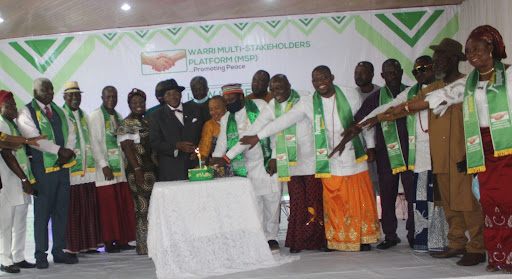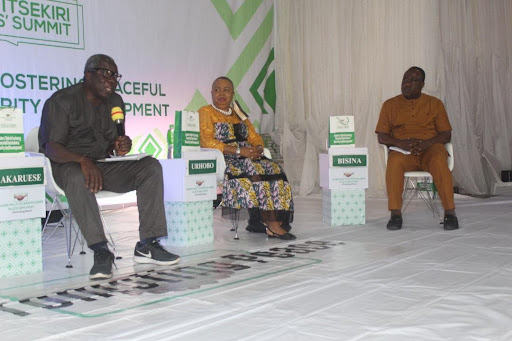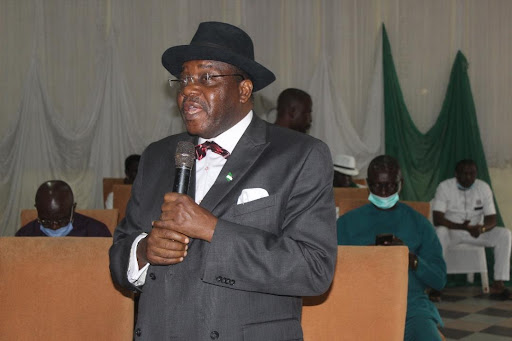In Niger Delta, Ijaw, Itsekiri Leaders Chart New Ways Towards Sustainable Peace
Participants at a recently held peace summit in Warri, Delta State, South-south Nigeria were at the forefront of establishing a sustainable peace and development in Warri as they pressed for alternative dispute resolution methods and non-violent approaches to demanding their rights.

‘Peace’. It’s a word that has gained increasing currency in the development debate over the last 20 years in Nigeria’s Niger Delta region, particularly in Warri, Delta State. How can Warri regain its lost glories, how can it return to the development path? And how can the ethnic groups bring back peace and harmony?
Well, the people and critical stakeholders and organisations which support them and promote peace initiatives spoke loudly at a recent Warri Multi-Stakeholders Platform (MSP) Leadership Summit.
The Summit heard leaders from Ijaw and Itsekiri ethnic groups, members of Civil Society Organisations (CSOs), government functionaries, and politicians, and community and opinion leaders within Warri North, Warri South, and Warri South West Local Government Areas.
The day focused on peace initiatives and peace building, peaceful co-existence, addressing conflicts, violence, eradicating poverty and bringing development to the once flourishing Warri city.
All the speakers at the Summit were at the forefront of establishing a sustainable peace and development in Warri as they pressed for alternative dispute resolution methods and non-violent approaches to demanding their rights.
For peace, we are here gathered today, says Princess Shola Ogbemi-Daibo, Delta State’s Commissioner for Technical Education, South-south Nigeria at the one-day Summit organised by the Warri Multi-Stakeholders Platform (MSP) with the theme “Role of Leaders in Fostering Peace, Co-existence, Security and Development”.
“The summit is long overdue considering diverse challenges and aspirations of the Niger-Delta region. One incontestable fact is that peace is the vehicle and precursor of sustainable development, the world over,” the Commissioner said.
“…so much resources have gone into peacebuilding measures to guarantee the enabling environment needed for investment and sustainable development.”

One of such structures, the Commissioner said, is the Peace Committee established by the state government to among other things engage in activities that promote and strengthen harmonious relations amongst communities in the state.
“I would like the MSP to work collaboratively with this Committee. The commitment of the State Governor to peace is to guarantee an enabling environment for local and external investors to feel safe to operate in our state more so as our people are also fundamentally peaceful and hospitable. Investors already in the area should make it a point of duty to add value to their host communities as that also increases their chance of sustaining their Social Licence to Operate,” she added.
Common to all speakers at the Summit was the desire to put aside the experience of the past that denied the city of Warri its glamour and investment and chart a new course. For instance, Kingsley Burutu Otuaro, the Deputy Governor of Delta State said at the Summit “It is time to unite and conquer in order to leave the next generation with cities and communities to be proud of, rather than conflict-torn communities and towns. Let’s build forward better. Let the factories reopen”.
“Let the steam engines start to work again. Let the ships start anchoring at the Warri port again. Let’s use all our political and intellectual and media platforms to promote peace and unity. Let’s prioritize progress over ethnicity,” the Deputy Governor said.
“The investors will smell our nectar again and the jobs will return. The glorious night of Warri will resurface and consequently across the Delta, and certainly, the greatness of Delta will be realized.”
Otuaro lamented that conflicts in Warri forced investors and multinationals such as Halliburton, McDermott, Schlumberger and Julius Berger, and several other corporations, including multinational oil companies, to leave for a safer haven. “Factories and major warehouses closed down. UAC, Michelin, Gold Spot, Toyota, and African Timber & Co. (AT & C–Sapele) closed their doors. The engines stopped grinding.”
So, Warri’s loss was the gain of Lagos and Ogun States. “The Lagos Port was enlarged and Warri Port lost it all and Ogun State became the next industrial hub as companies sought refuge to set up factories and industrial estates where they could carefully exploit the massive Nigerian consumption market.”

Dr Jeffrey Wilkie , Co-Chairman, Warri Multi-Stakeholders Platform said the Summit came at the most appropriate time. “There is no better time than this, to hold such a significant summit, as it will go a long way to build on the existing peace between the jaws and Itsekiris,” Wilkie told participants at the Summit.
“This Summit is held in the week of World Peace Day, which is a day of tolerance. This is equally significant as the world is now choosing Cooperation Over Conflict.”
He emphasized that the Niger Delta region needs an enduring, lasting and sustainable peace. “We need enduring, lasting and sustainable peace. Peace between the Ijaws, Itsekiri and by extension the whole world is sacrosanct because it is peace for the Niger-Delta, peace for Nigeria and peace to the world.”
Wilkie told the summit that “What armed struggle cannot achieve, round table discussion can do.” “What guns and grenades could not achieve in decades, dialogue can achieve in minutes or hours.”
Boladei Igali, Pro-Chancellor and Chairman of the Governing Council of the Federal University of Technology, Akure (FUTA) called on leaders in Ijaw and Itsekiri communities to embrace alternative dispute resolution.
All over the world, Alternative Dispute Resolution has become the vehicle for resolving conflicts when they arise, Igali said, stressing also that there “must be a framework of early warning
systems to identify upcoming threats and nip them in the bud before they escalate to assume conflict dimension”.
“Our leaders, religious, traditional and political, should be able to put in place such an approach to solving problems as they begin to take form.”
As he expressed optimism that peace will pervade Warri city henceforth, Igali stressed the need for greater socialisation and domestic mentoring of the youths which he said will help to develop the spirit of civility and respect for the identities and peculiarities of others.
“I am optimistic that peace pervades the city of Warri and indeed the entire Niger Delta region, as a panacea for the sustainable development that we all envisage. And now is the time to see that happen,” Igali said.
Like Igali, the Commissioner for Technical Education also concluded by calling on “traditional and community leaders, politicians, women and youths to eschew violence and things which divide us and embrace peace, tolerance and good neighbourliness on which our development is premised”.
“Drawing from the lessons of the Tower of Babel, unity is all we need to bring our cherished dreams to pass. According to Christopher Robin, “together we are stronger, together we are unbroken, together we can do anything”-God helping us.”
Dr David Udofia, Peace Building Manager at the Foundation for Partnership Initiatives in the Niger Delta (PIND) pinpointed peaceful co-existence as the pivot for security and economic transformation of the Warri kingdom. It alluded to the theme of the Summit as being in consonant with PIND’s framework of nurturing leadership in peace and economic development for advancement of the region.
Lawal Africas, Warri MSP Facilitator said the Summit was organised to galvanise thoughts from all the stakeholders on how to achieve a paradigm shift in peace building and conflict resolution among Ijaw and Itsekiri ethnic groups in Delta State.
Africas said such a platform as Warri MSP must be sustained and capacity of members built to strengthen partnership of critical stakeholders at the three tiers of government and also in their dealings with the multinationals operating in the Niger Delta region.
Support Our Journalism
There are millions of ordinary people affected by conflict in Africa whose stories are missing in the mainstream media. HumAngle is determined to tell those challenging and under-reported stories, hoping that the people impacted by these conflicts will find the safety and security they deserve.
To ensure that we continue to provide public service coverage, we have a small favour to ask you. We want you to be part of our journalistic endeavour by contributing a token to us.
Your donation will further promote a robust, free, and independent media.
Donate HereStay Closer To The Stories That Matter




